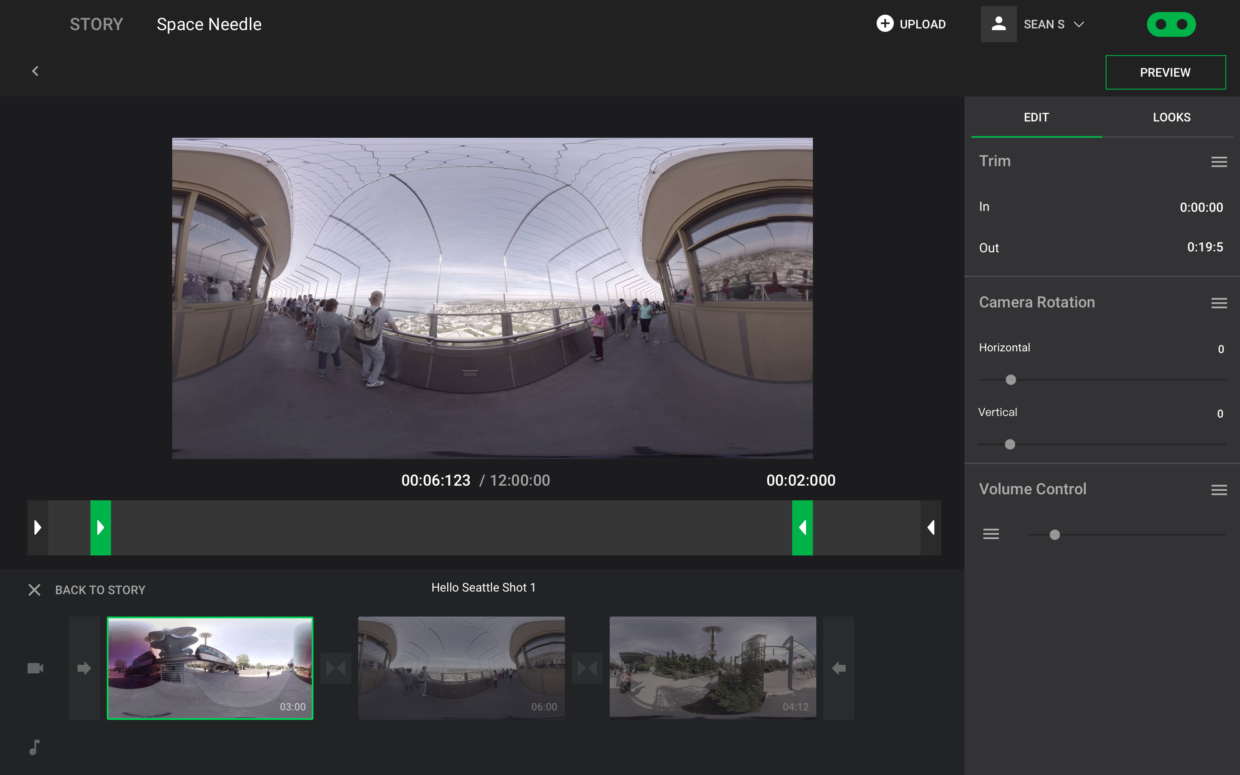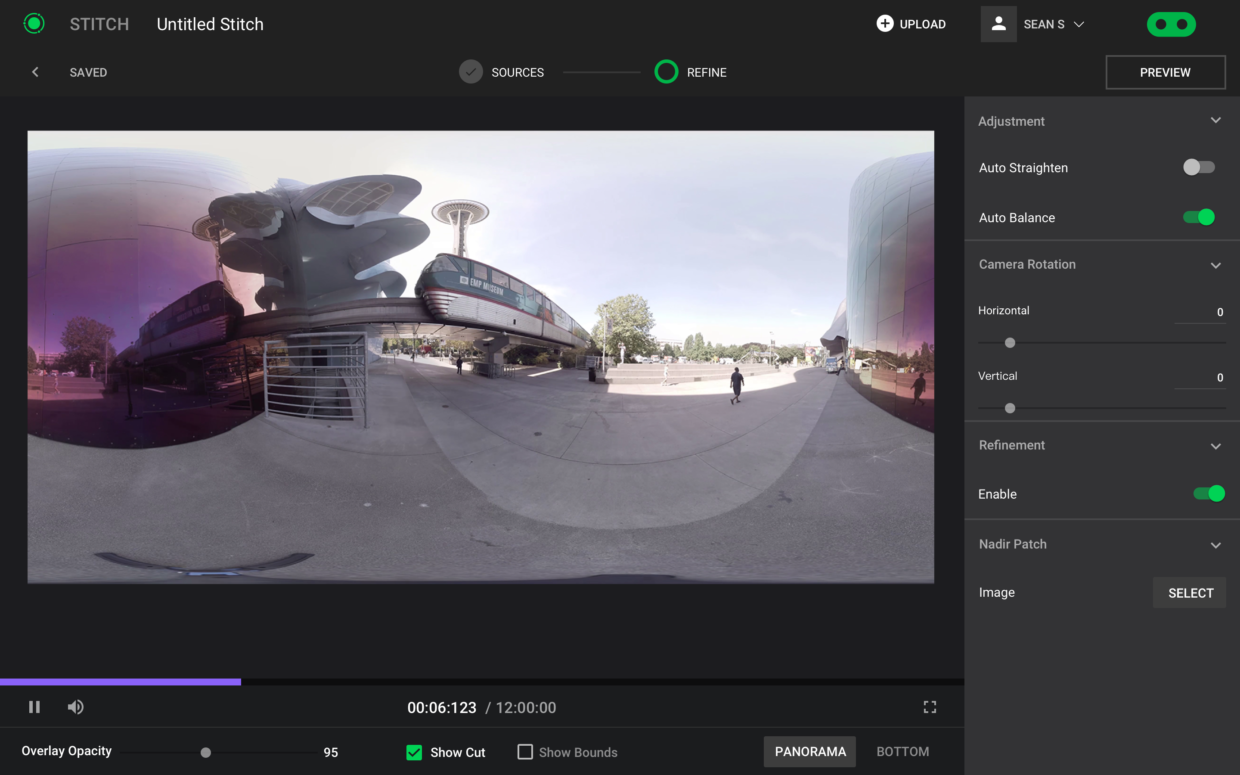
From the moment you walk into Pixvana’s office, it’s hard to miss the images of King Kong. The film and its cultural significance have become a symbol for the Seattle startup in a unique way — it’s a reminder of the company’s mission to help filmmakers make epic stories using the nascent technology of virtual reality.
After raising a $6.1 million seed round led by Madrona Venture Group one year ago, Pixvana today unveiled more details about its technology, which helps power a cloud-based end-to-end platform for editing, processing, and delivering VR video that Pixvana CEO Forest Key said will help VR filmmakers and producers do better work.
“We want to build a platform so that filmmakers can go out and tell stories like King Kong,” Key told GeekWire last week at his office in Seattle’s Fremont neighborhood. “Our team mission is to figure out how to enable VR storytelling.”


Pixvana on Monday announced SPIN Studio, an all-in-one cloud-based software product that helps users edit, finish, publish, and playback video files for virtual reality content.

Key, who sold hotel marketing startup Buuteeq to Priceline in 2014, explained that it’s not easy to create virtual reality content using film editing and production software built for traditional video. Today, storytellers are forced to use desktop tools that weren’t built with VR in mind, and that creates problems like extremely long rendering times and limited editing capabilities.
SPIN Studio, meanwhile, utilizes cloud infrastructure and VR-centric editing software designed from the ground up. The product consists of SPIN Publisher, SPIN Player — both which soft-launched in September — along with SPIN Stitch, SPIN Story, and SPIN Finish, which debuted today.
“It’s a cloud-first, cloud-only VR native solution as opposed to desktop software built for video 20 years ago being retrofitted,” Key explained.

SPIN Studio has unique features like SPIN Publisher, which uses field-of-view adaptive streaming technology that helps provide end users with a crisper 50-megapixel video resolution by breaking up video into a series of “viewports.” Pixvana is partnering with Bellevue-based gaming giant Valve for that feature.
There’s also SPIN Stitch, which syncs and stitches clips from a variety of camera rigs, and SPIN Player, which delivers VR video to various headsets with low latency.
With a combination of advanced VR production and delivery tools, Key said there’s nothing really like SPIN Studio on the market today. It will become available in public beta early next year; pricing has yet to be announced.
“Our mission is to realize the potential of this new medium,” Key noted.
Pixvana is working with beta clients like Tippett Studio and the Seattle Sounders. Key said the target market is wide-ranging but with a focus on businesses that can use Pixvana to create VR videos for everything from entertainment to marketing to data visualization.
Here are a few examples of videos Pixvana has created using its platform:
As far as potential business models, Key said clients could pay on a “metered bill” system that charges based on usage of Pixvana’s cloud infrastructure. The software will be built not only for companies working with virtual reality but also augmented and mixed reality film, Key added.
Key also said that Pixvana, a Seattle 10 company that was honored this month as one of the region’s top up-and-coming startups, has “plenty of cash in the bank” from its $6.1 million seed round that included participation from Vulcan Capital and angel investors like ‘Soma’ Somasegar, Mike Galgon, Geoff Entress, Charles Fitzgerald, and John Keister, in addition to Madrona. The startup employs 19 people, up from six at this time last year.

Though Key’s last company was involved with online hotel booking, he spent a good chunk of past few decades working in digital media. After studying film history at UCLA, he started his career at Lucasfilm on the visual effects team before moving on to places like Adobe and Microsoft where he helped develop important web-based video technologies like Flash and Silverlight.
His co-founders have impressive resumes, too, with expertise in software platforms, visual effects, video production, codecs, and content creation. Chief Technology Officer and Creative Director Scott Squires is a well-known Sci-Tech Academy Award winner known for his visual effects work and also a veteran of Lucasfilm. Chief Product Officer Bill Hensler was previously the senior director of engineering at Apple where he worked on photo apps and imaging technologies, while VP of Product Management Sean Safreed is the co-founder of film and video software startup Red Giant.
“It feels like the thing we were born to do, in some ways,” Key said of launching Pixvana with his co-founders.

Key added that he’s still extremely optimistic about the impact of virtual reality technology and said the new medium is “going to change the world” — just not today or tomorrow. For now, it’s very much the Wild West, with a ton of potential — but “everyone in the VR community has kind of to succeed together” for that potential to be realized, Key said.
Pixvana is in it for the long run.
“Unequivocally, I think this will be a huge thing,” Key said. “It’s not going to happen in one or two years, though. Maybe five or ten.”
Added Key: “This is the beginning of what we think will be years of innovation in VR editing tools and VR storytelling.”
Pixvana is one of many new up-and-coming virtual reality startups in the Seattle area. Others include Envelop VR, Pluto VR, AxonVR, VRStudios, VREAL, Endeavor One, Nullspace VR, and several others. That’s in addition to larger companies like Microsoft, Valve, HTC, and Oculus that are developing virtual and augmented reality technologies in the region.











